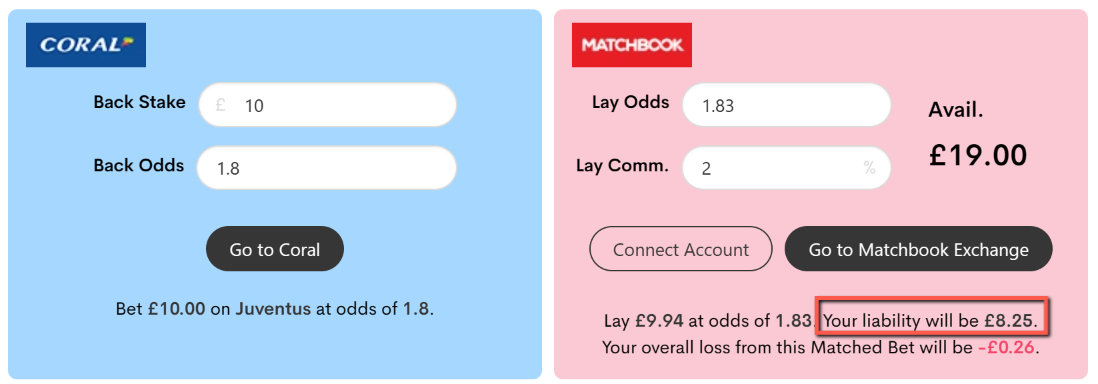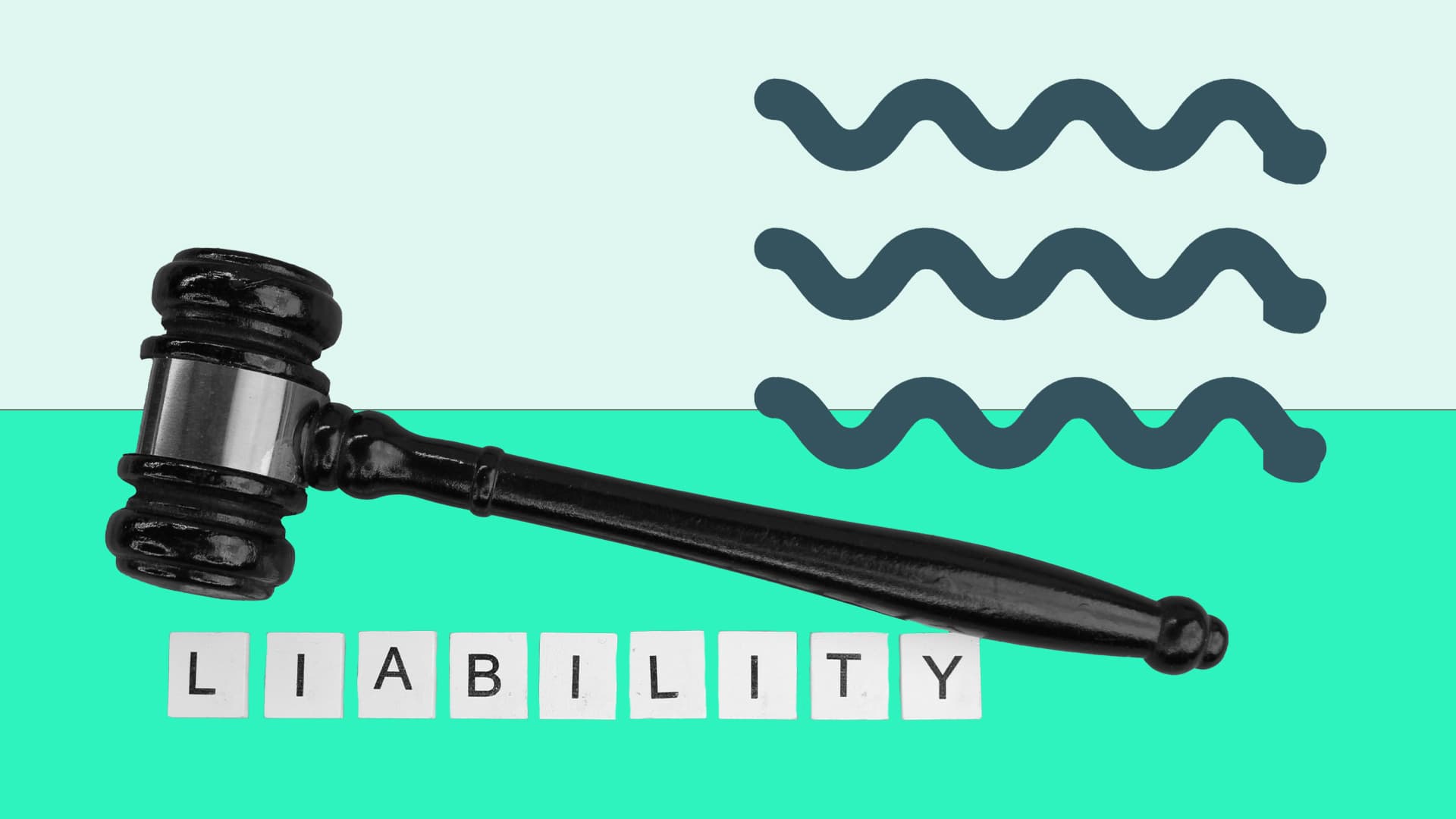What Is Liability In Matched Betting?
Liability in Matched Betting is the amount of money you need in your betting exchange to cover your lay bet.
If your lay stake is £5 with a liability of £30, you’ll need at least £30 in your betting exchange account if you want to be able to place your lay bet successfully.
In this post, you’ll find out how liability works to help give you a better understanding of Matched Betting.
How Does Liability Work In Lay Betting?
When you place a lay bet at a betting exchange – you’re acting just like a bookmaker does.
For example, a bookmaker is offering odds of 2.0 (1/1) on Liverpool to win. If you decided to place a £10 bet on Liverpool to win, then you’re making the following agreement with the bookie:
- If Liverpool win, the bookie will return your £10 stake plus £10 in winnings (so £20 in total). You’ll be £10 up and the bookie will be £10 down.
- If Liverpool don’t win, the bookie will keep your £10 stake. You’ll be down £10 and the bookie will be £10 up.
Based on 'the terms' of this agreement, when you place your bet, the bookmaker will be liable for paying you £10 in winnings if your bet wins.
Liability in (normal) back betting therefore refers to the amount of winnings a bookmaker has to pay out to a punter if their bet wins.
As you’re acting like a bookmaker at the exchange when you place your lay bets, you’ll have the liability, or winnings to pay out, to a bettor at the exchange if your lay bet loses.
Your lay bet stake represents the stake amount you’re agreeing to take on from a bettor who’s doing a normal bet (or a back bet) at the exchange. When you agree to take this amount, which is done through placing your lay bet, you also automatically agree to pay out winnings to this bettor if their bet wins and your lay bet loses.
These winnings that you may need to pay out to the bettor are the liability of your lay bet.
It’s worth noting that the betting exchange only takes the liability amount of your lay bet from your balance and not the lay stake amount. You’ll only need to pay out winnings to the bettor, not their stake plus winnings.
When Matched Betting, you’ll see the liability of your lay bets displayed on the calculator:

In this example, your liability is £8.25 so you’d need your betting exchange account to have at least £8.25 to place this lay bet.
Remember, as you’re Matched Betting, whether your lay bet wins or loses at the exchange doesn’t matter, as you know the exact opposite outcome is occurring at the bookmaker where you’ll have placed your back bet so either way you’re covered.
What You Need To Know About Liability In Matched Betting
When you successfully place your lay bet at the exchange, your account balance will go down by the amount your liability was. This liability will then be 'locked away' from you until the bet settles (when the event ends the bet is a winner or loser).
If you had £50 in your betting exchange account and placed your £5 lay bet with a liability of £30, your betting exchange account balance would drop by £30 to £20.
It’s important to remember that the betting exchange hasn’t taken this £30 from you - but just 'locked it away' from you. You’ll be able to see the amount 'locked away' from you in your account balance section next to the term 'exposure'.
When using Matched Betting, when your bet ends and your bets settle, one of two things will happen:
1. If your lay bet loses, you’ll lose your liability in the exchange but your opposite back bet at the bookmaker will have won to cover that amount you lost at the exchange.
2. If your lay bet wins, your liability will be returned to your account plus you’ll also win your lay stake amount (minus any commission charged by the exchange).
These two scenarios are displayed on the Matched Betting calculator to show you the overall position regardless of which bet wins or loses. When using a free bet, your position will look similar to this:

Liability Tips When Matched Betting
Now you know how liability works, there are some key tips to remember when Matched Betting that’ll help you on your journey:
Check your exchange balance
To successfully place a lay bet at any betting exchange your balance at the betting exchange must be the same or larger than the liability of your lay bet. If your balance is lower than the liability amount needed, the exchange will not allow you to place your lay bet.
Higher odds = higher liability
The higher the odds you use in Matched Betting the higher the liability of your lay bet.
This means you’ll need more balance available in the betting exchange. If you’re starting with a smaller Matched Betting bankroll, you can use lower odds to keep the liability manageable.
Larger stakes = higher liability
Similarly, the larger the lay stake at the betting exchange, the bigger the liability will be. For example, a £50 lay stake will require more money to lay than a £5 lay stake using the same lay odds.
If you’re using a limited bankroll, you can focus on offers that require a smaller qualifying bet amount so you have enough funds to cover the liability amount.
Stretch your bankroll further
In the vast majority of cases, when you place 2 or more lay bets on different outcomes (or selections) within the same market at the same betting exchange your liability gets split between each selection.
This happens when all the lay bets can’t be lost. For example, you’re using a match between Liverpool and Chelsea - you have one lay bet on Liverpool for one offer, another lay bet on Chelsea for another offer and a third lay bet on the draw for another different offer.
Only one of these lay bets can lose.
This causes an overall reduction in your total amount of liability needed to place those lay bets and allows you to place more lay bets at the same exchange without needing to add any more balance, this is known as shared liability.
Summary
Understanding liability and liquidity will give you a great head start on your Matched Betting journey, help you see how betting exchanges operate and how you can use them to Matched Bet like a pro!
Now you know how liability works alongside your bankroll, you’ll be ready to learn how to manage your money effectively using our alternative to a Matched Betting spreadsheet.
Updated: 24 Dec 2024
The Author
Ben is an expert in Matched Betting with nearly a decade of hands-on experience. He enjoys sharing his knowledge and is dedicated to creating high-quality, beginner-friendly content that educates and informs readers about the amazing opportunity that Matched Betting is.

